The state of
generative AI
in the enterprise 2024

Introduction
Generative AI has transitioned from a futuristic concept to a powerful business technology, catching the attention of enterprise leaders. In 2023, companies carefully looked at the potential of generative AI. But in 2024, it’s become a powerful force that can change businesses in many different industries. To gain a comprehensive understanding of its adoption and impact, we collaborated with Dimensional Research to conduct an extensive survey among enterprise leaders.
Understanding the insights gathered from our survey will help large companies make informed decisions about implementing generative AI.
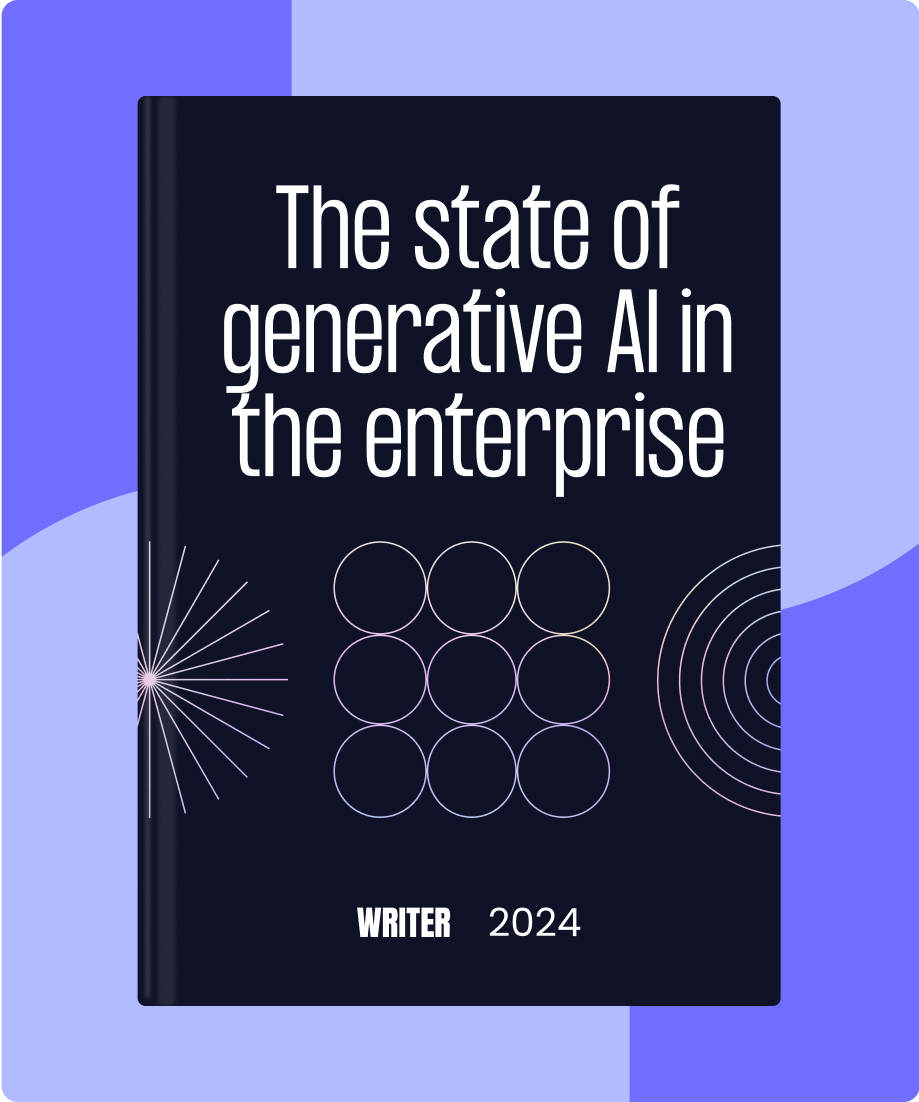
Download the ebook
Who we surveyed
The survey included a diverse group of 501 respondents, all of whom have specific responsibilities related to AI. These individuals represent senior executives such as VPs, GMs, and C-level leaders. The respondents were from five continents, providing a global perspective on the application and effects of generative AI.
The companies involved in the survey were enterprise organizations having between 1,000 to over 10,000 employees. These companies spanned a wide array of industries, including technology (both software and non-software sectors), financial services, telecommunications, education, healthcare, manufacturing, retail services, government, and more. This wide-ranging participation highlights the broad interest and use of generative AI across different sectors and scales of business.
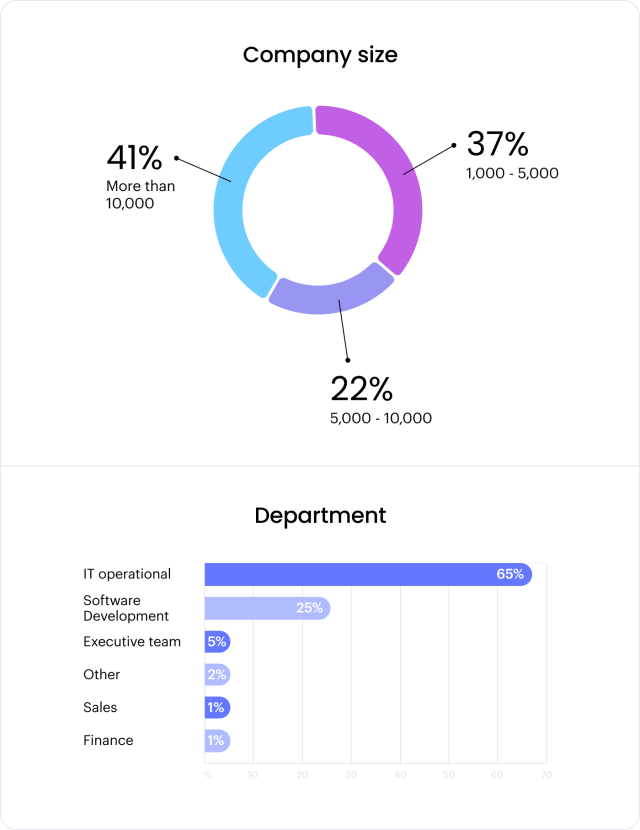
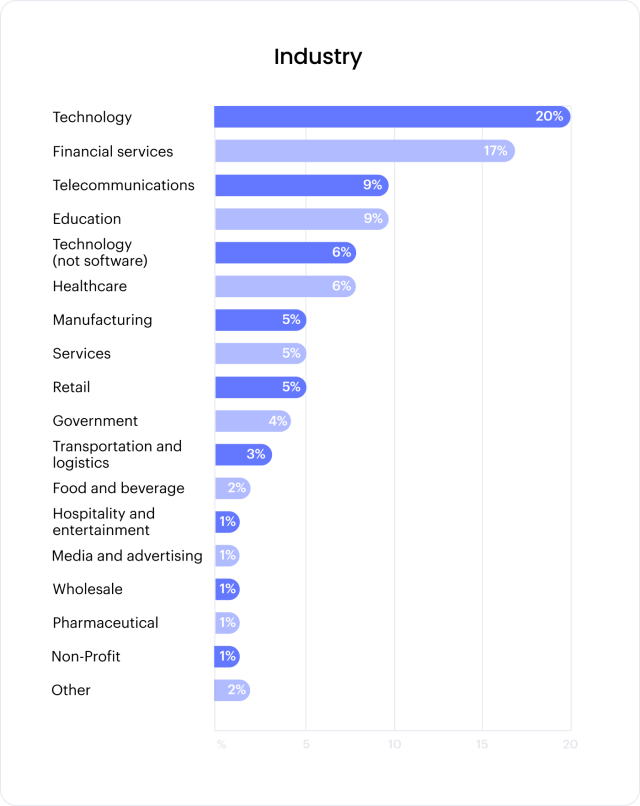
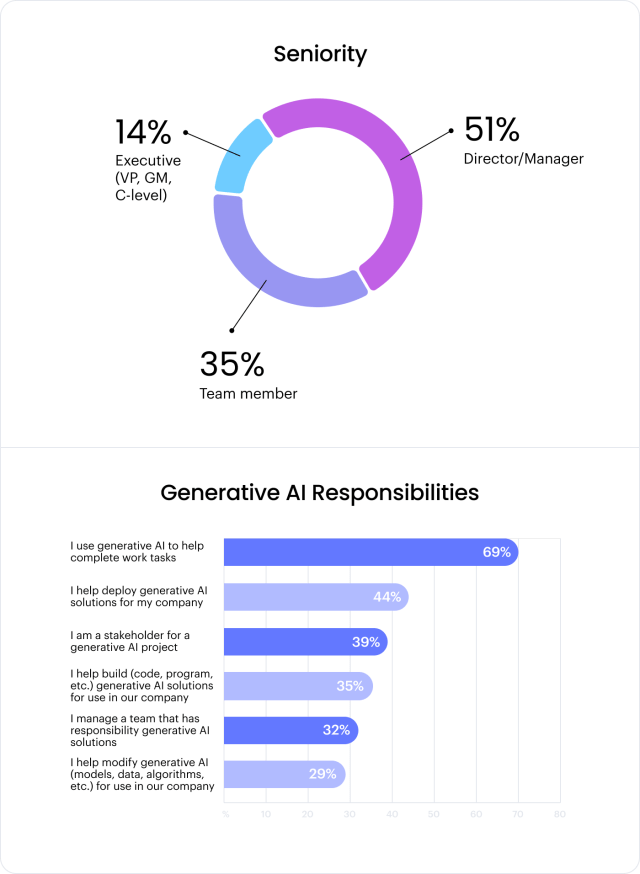
By collecting firsthand experiences and opinions, our aim was to uncover the challenges, benefits, and future prospects associated with this transformative technology.
Key findings

- Widespread adoption and expectations
96% of companies view generative AI as a key enabler, with 82% anticipating rapid growth in its adoption across various departments. - Significant benefits across departments
The most significant benefits will be seen in IT, security, and customer service, with generative AI improving efficiency, reducing costs, and enhancing customer satisfaction. - Security and data concerns
95% of companies have concerns about the need for enhanced security measures, while 94% also have concerns about data protection with generative AI applications. - Challenges with in-house solutions
61% of companies have faced accuracy issues with in-house generative AI solutions, and only 17% rate their in-house projects as excellent. This highlights a general dissatisfaction with the performance of self-developed AI solutions. - Preference for private (in-house) solutions
78% of companies are using or planning to use home-grown generative AI solutions because of their concerns about security and data governance. - Expertise shortage
Only 10% of AI professionals expressed high confidence in their ability to develop effective in-house solutions. This highlights a notable lack of confidence in building quality in-house generative AI solutions. - Security, reliability chief among commercial solutions criteria
Given the challenges and low confidence in in-house development, there’s a strong preference for commercial generative AI solutions that can offer reliability, security, and ease of integration.
In this report, we’ll shed light on the widespread recognition of and trust in generative AI as a key enabler for businesses. We’ll explore the specific teams at the forefront of adopting generative AI, as well as explore the potential for its expansion into new departments. Additionally, we’ll address critical aspects such as security, data management, and the perspectives on building in-house generative AI solutions.
High expectations and rapid adoption across the organization
Generative AI has become a key enabler for enterprise companies, with 96% of companies expecting it to play a crucial role in their business.
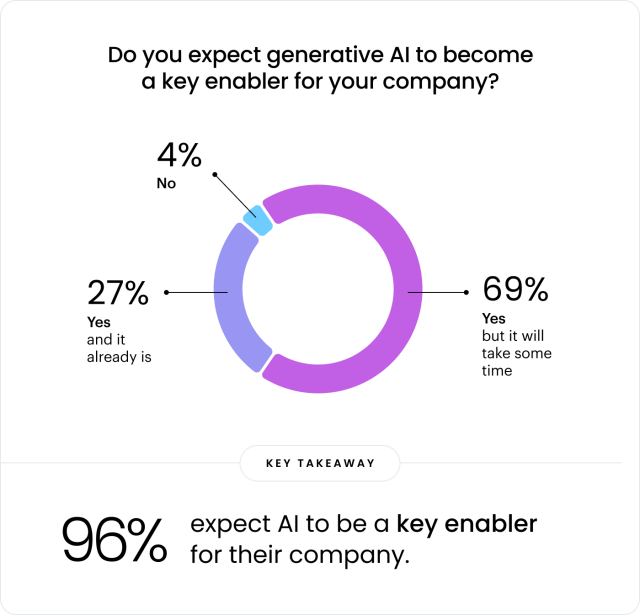
This high level of expectation reflects the growing recognition of generative AI’s potential to drive efficiency, save time, reduce costs, and deliver strategic benefits such as increased customer satisfaction, improved product quality, and faster time to market.
82% of business leaders believe that the use of generative AI will experience rapid growth over the next two years. This projection highlights the increasing recognition of generative AI’s value and its potential to reshape various aspects of business operations.
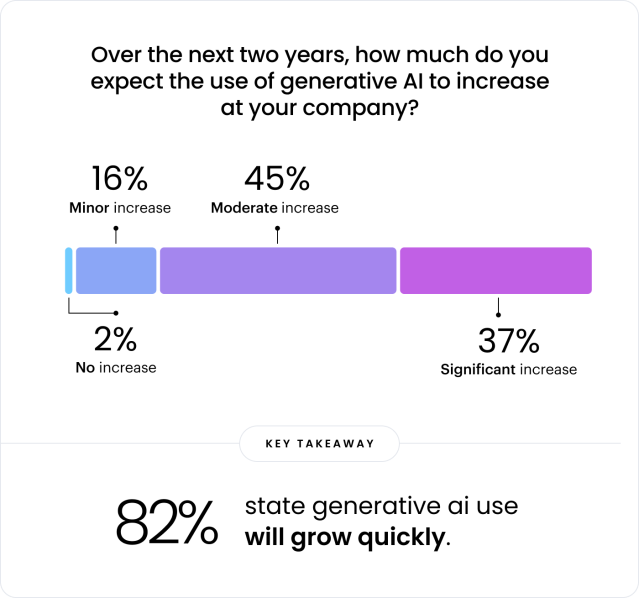
When it comes to the areas where generative AI will deliver the most significant benefits, IT, customer support, and security teams stand out as the top contenders. These departments recognize the potential of generative AI to simplify processes, enhance customer service, and bolster security measures.
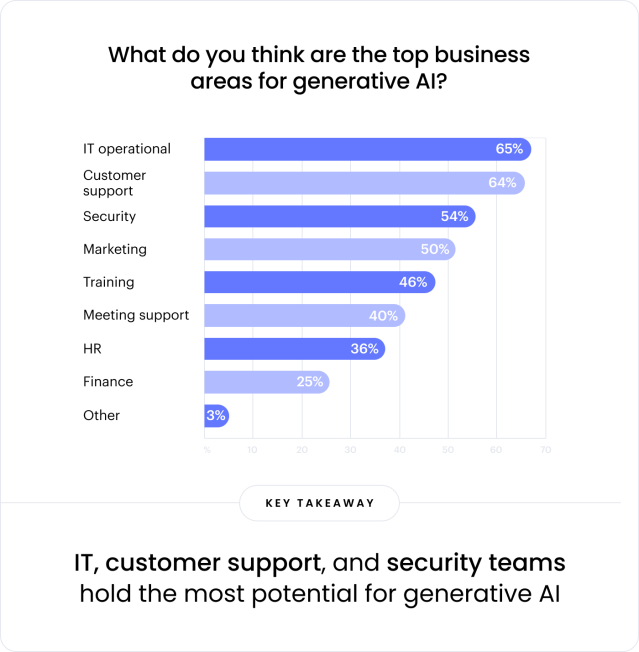
Survey respondents highlighted several tactical benefits of generative AI, pointing out its role in increasing efficiency, saving time, and reducing costs. These benefits are especially valuable because they let companies improve operations and manage resource allocation more effectively, which supports broader strategic objectives.

Currently, 68% of companies have three or more teams using generative AI for work-related tasks. The early champions of generative AI are IT and customer support teams, showing a proactive embrace of this advanced technology.

Looking ahead, 97% of companies expect that new teams will begin using generative AI over the next two years. The training, product management, and HR teams will have the highest rate of adoption. The increasing use of generative AI across teams demonstrates the growing understanding of its benefits beyond initial adopters.
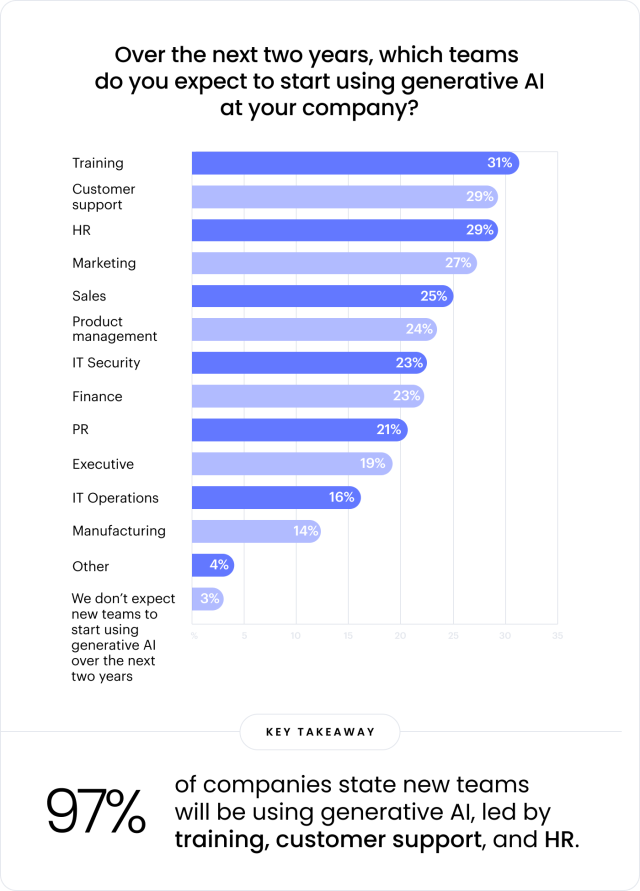
Businesses should actively look for more ways to use generative AI to get the most value from it. By exploring new use cases and involving diverse teams, your company can tap into the full benefits of generative AI and propel innovation across your organization.
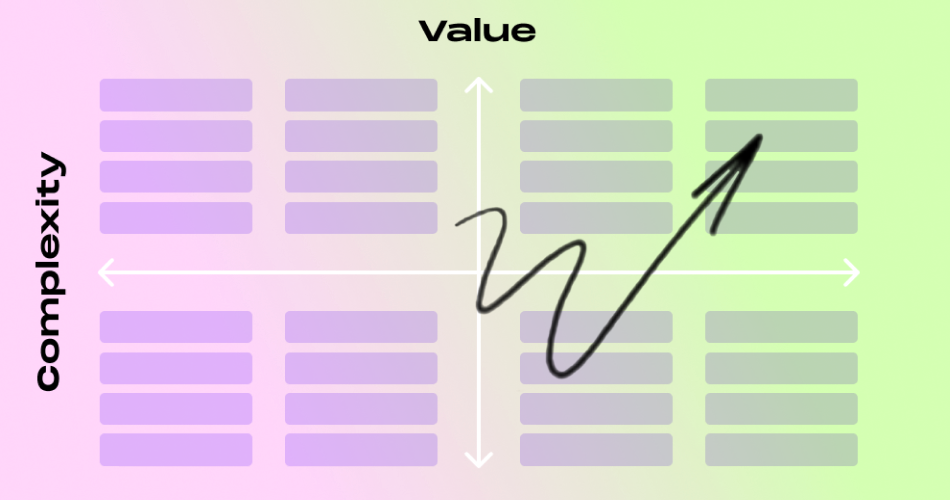
How enterprise companies can map generative AI use cases for fast, safe implementation
Learn more on the blog
Security and data protection is top of mind
The adoption of generative AI is making enterprise leaders reimagine what’s possible while reinforcing the need for heightened security and data protection. The survey found that 95% of respondents believe more security is necessary for generative AI used in business applications, and 94% view data protection as a significant concern.
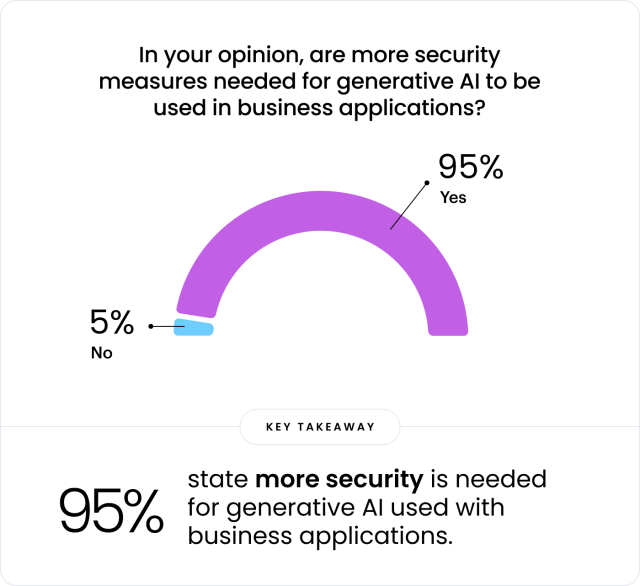
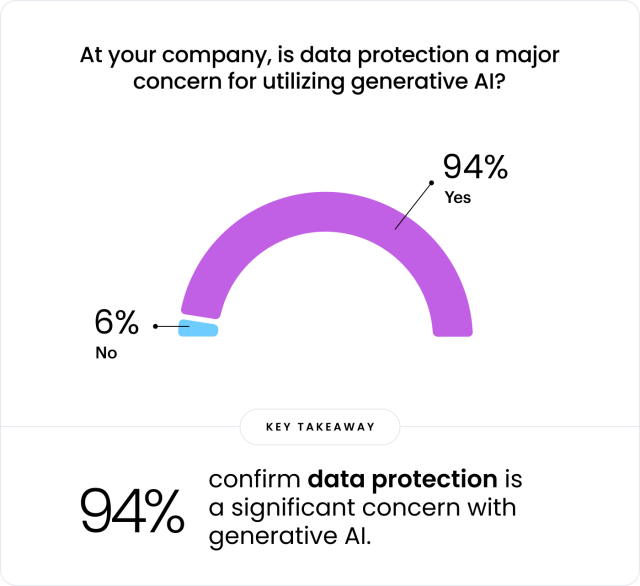
Among the key security controls needed for generative AI are data control and access. This means having strict measures in place to regulate who has access to the data that AI systems use. Companies should have complete control over their data and limit access based on who needs it, what it’s used for, and how long it’s been there. This can help protect sensitive data from being shared.

Building in-house generative AI solutions is popular — and challenging
Concerns over security and data management have led many companies to opt for in-house or private solutions for their generative AI needs. In fact, 78% of businesses surveyed are either already using or planning to use an in-house generative AI solution.
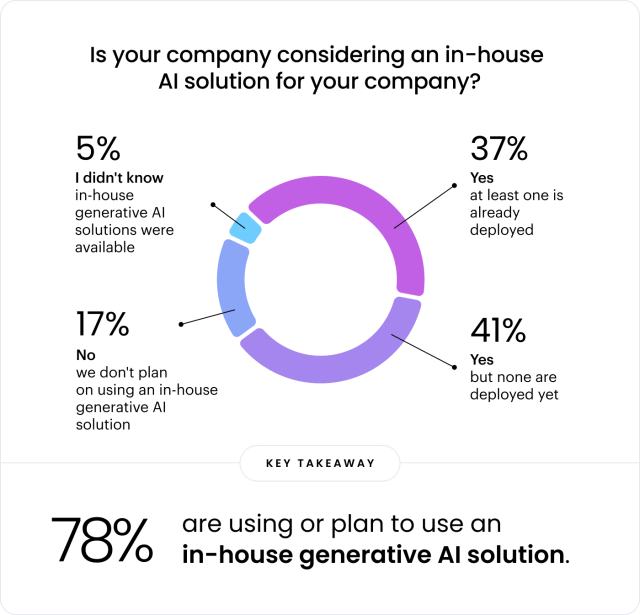
The most popular approach to sourcing generative AI is taking a hybrid, in-house approach. 52% of our survey respondents said their internal development teams are using third-party solutions to build an in-house generative AI solution. There’s also notable usage of commercial and open-source solutions, in addition to in-house models that are completely designed, coded, and trained internally.
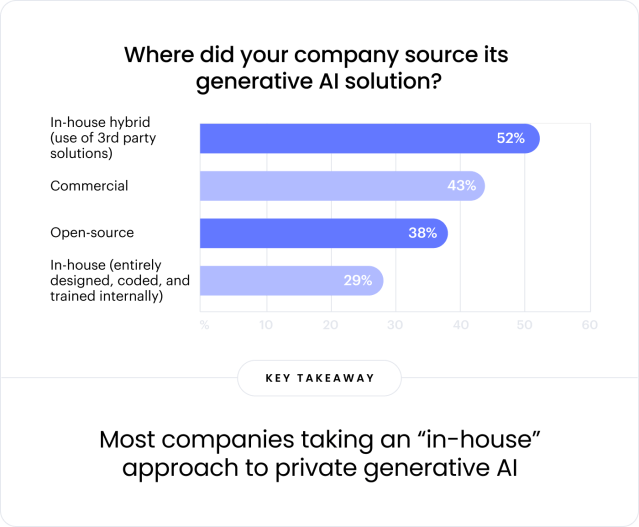
Many enterprise companies are eager to build their own generative AI capabilities, but these early efforts are filled with challenges and complexity. Developing a successful AI product requires a nuanced approach and a deep understanding of how this technology works.
The survey reveals that 88% of companies expect it to take six months or longer to have an in-house generative AI solution operating reliably.
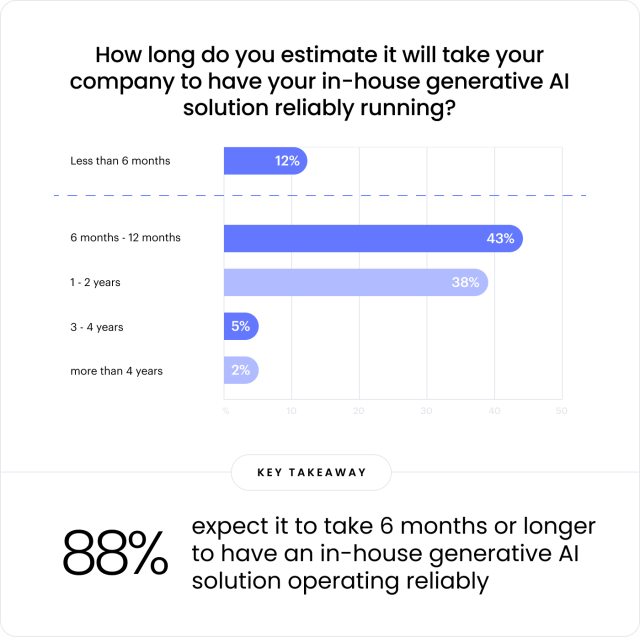
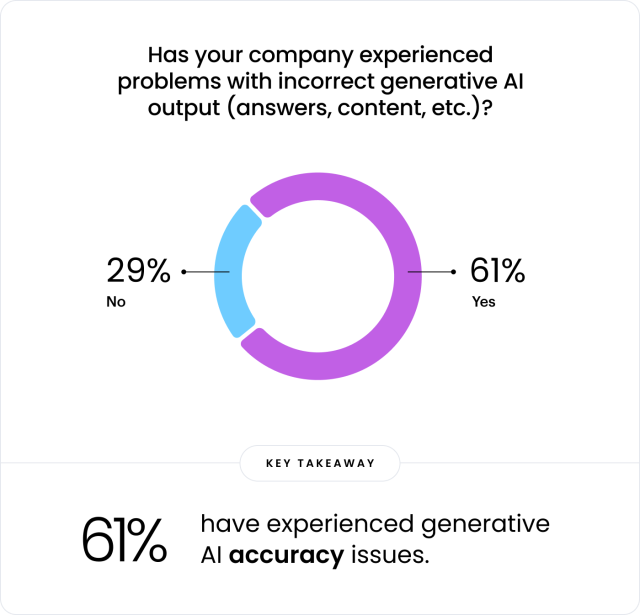
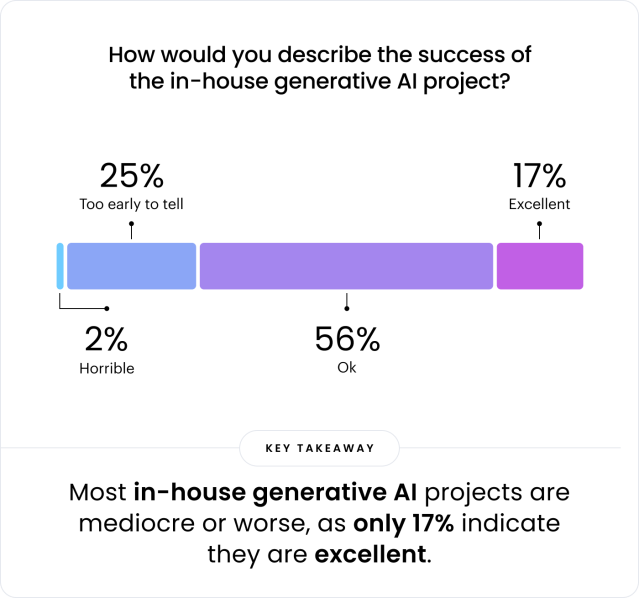
The survey also shows that many professionals don’t trust their ability to build good AI solutions in-house. In fact, only 10% of them are very confident.
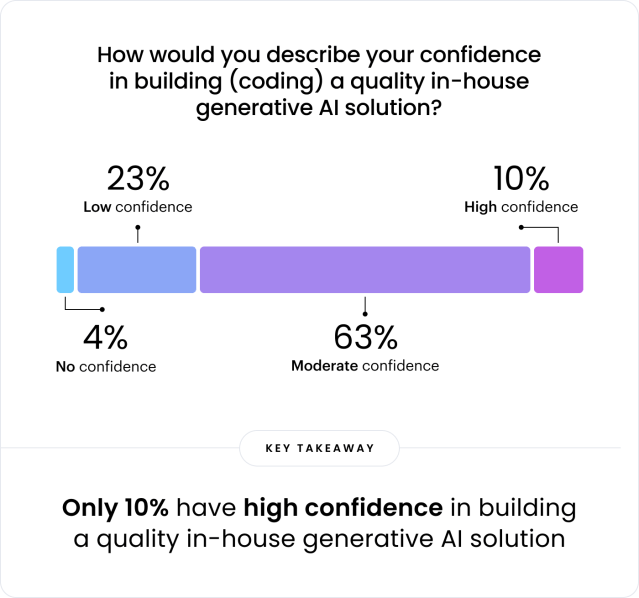
The accuracy problems reported make this lack of confidence worse. They show that there is a lack of expertise and knowledge needed to develop and manage generative AI effectively.
Stitching together your AI stack is difficult. It requires selecting and integrating an LLM, building a RAG, creating AI guardrails, and building apps from scratch. A full-stack platform with these key components already integrated simplifies and speeds up the deployment process. Picking a platform that allows for a high degree of customization at the app layer is also important to support a range of use cases.

Build vs. buy: What’s the best solution for your enterprise generative AI program?
Learn more on the blog
Businesses prioritize security and data governance in commercial AI vendor selection
Considering the big concerns about security and data control, it should be no surprise to hear that respondents said the top criteria for selecting a commercial AI solution include security controls, data governance, reliability, and the ability to run privately.
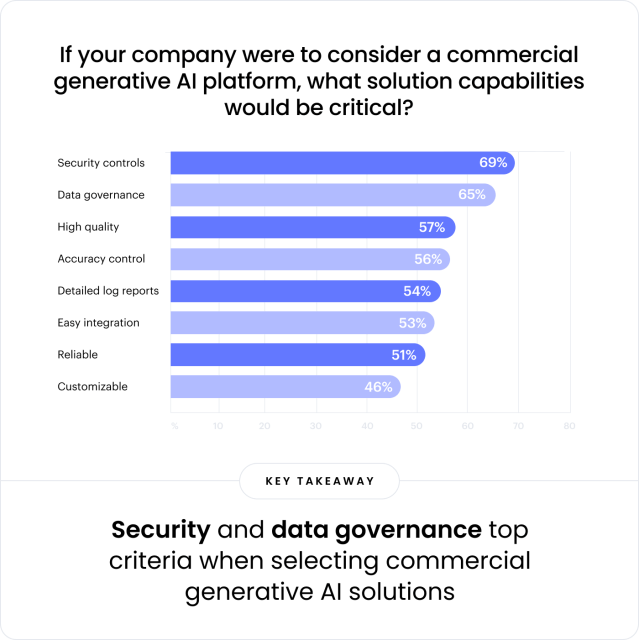
Companies also value solutions that are customizable, integrate easily with existing systems, and guarantee accuracy and high quality in their outputs. These criteria show the need for secure, reliable, and effective AI solutions that match business requirements and data protection standards.
Selecting the right commercial AI vendor is crucial for businesses looking to maximize the benefits of generative AI. The criteria identified through our survey reflect the core considerations that influence this decision, guiding enterprises like yours to make informed choices that match their strategic goals.
- Security and data governance
A significant majority of respondents (95%) expressed a need for stronger security measures for AI applications, with 94% also highlighting data protection as a major concern. Successful vendors should offer powerful security features, including comprehensive access controls, detailed compliance logs, and stringent data protection policies to safeguard sensitive information. - Reliability and accuracy
AI solutions must be reliable and accurate. Respondents said they would focus on these aspects when selecting a vendor. Businesses need AI systems that consistently perform well and deliver accurate results to maintain operational integrity and trust in AI-driven processes. One key to achieving output accuracy is using a graph-based retrieval-augmented generation system for company-specific knowledge retrieval. - Customization and integration capabilities
Customization and easy integration into existing systems are crucial, as they allow businesses to tailor AI functionalities to their specific needs. Vendors should offer flexible solutions, like app extensions and APIs, that can fit into different business settings. - Private deployment options
With 78% of companies either using or planning to use private AI solutions, the ability to deploy AI privately is a significant factor in vendor selection. This approach helps companies maintain control over their AI applications and data, aiding in compliance with industry regulations and internal policies. - Vendor experience and expertise
Choosing a vendor with a solid track record and deep expertise in AI is essential. Experienced vendors are more likely to understand and meet business-specific challenges, leading to smoother implementation and better outcomes.
It’s essential for enterprises to consider these factors and meticulously assess potential AI vendors to find the perfect match for their needs in security, reliability, customization, privacy, and expertise. Engaging in thorough discussions and requesting detailed demonstrations of vendor capabilities can further aid in the selection process, promoting a partnership that enhances business value and innovation.

How to evaluate LLM and generative AI vendors for enterprise solutions
Learn more on the blog
Actionable insights for leading with AI
Putting the insights of this report into practice is vital for businesses to maximize the potential of generative AI as a strategic tool, boosting efficiency, customer satisfaction, and competitive edge. Businesses can use these steps to get the most out of generative AI while avoiding problems:

- Prioritize security and data governance
As your company uses generative AI across various business functions, it’s crucial to put in place strong security measures and data governance protocols. This not only protects sensitive data but also builds trust among users and stakeholders. - Invest in enterprise-grade commercial AI solutions
Given the challenges associated with in-house generative AI projects, such as long development times and issues with accuracy, companies should consider using commercial AI solutions designed to support enterprise teams. These are often more reliable and can provide a quicker return on investment, enhancing customer satisfaction and competitive edge. - Expand AI across teams
With generative AI proving beneficial in areas like IT, customer support, and security, businesses should plan to roll out AI tools across other departments, including HR, training, and more. This broad acceptance can boost efficiencies and innovation throughout the organization. - Invest in AI skills development
Addressing the talent gap in AI expertise is critical. Investing in training and development programs for current employees can help in building the necessary skills to use and manage AI solutions effectively. - Track AI performance and impact
Continuously measure the performance and business impact of AI implementations. This will not only help in fine-tuning AI models but also in demonstrating the value of AI investments to stakeholders. By following these guidelines, companies can better use the incredible capabilities of AI while also safeguarding themselves from potential risks.

A six-step path to ROI for generative AI
Learn more on the blog